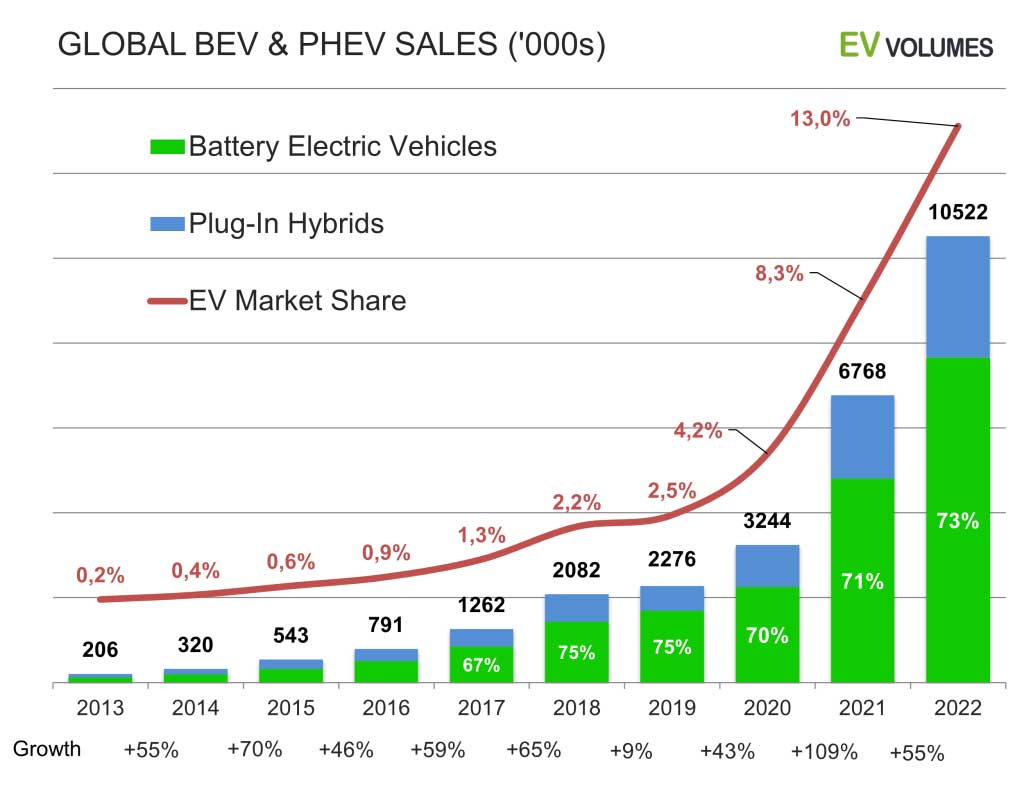BYD's Rise: Ford's Brazilian Decline And The Global EV Market

Table of Contents
BYD's Aggressive Expansion in Brazil and Beyond
BYD, the Chinese automotive giant, has rapidly become a major player in the global EV market, particularly in Brazil. Their success is a testament to their strategic approach and innovative technologies.
BYD's Competitive Advantages
BYD's success isn't accidental. Several key factors contribute to their competitive edge:
- Superior battery technology and range: BYD's Blade Battery technology offers increased energy density and improved safety, resulting in longer ranges and faster charging times for their electric vehicles. This directly addresses a major concern for potential EV buyers: range anxiety.
- Competitive pricing strategies: BYD has successfully positioned its EVs as competitively priced compared to gasoline-powered vehicles and other EVs in the market, making them accessible to a broader consumer base. This includes various financing options to make their EVs more affordable.
- Strong government support in key markets: Government incentives and subsidies for EV adoption in several countries, including Brazil, have played a crucial role in BYD's success. These policies have stimulated demand and reduced the initial cost of ownership for consumers.
- Focus on vertical integration: BYD's control over much of its supply chain, from battery production to vehicle assembly, gives them a significant advantage in terms of cost control, quality assurance, and responsiveness to market demand. This reduces reliance on external suppliers and potential disruptions.
- Successful marketing campaigns targeting environmentally conscious consumers: BYD's marketing effectively targets the growing segment of environmentally conscious consumers seeking sustainable transportation options. Their messaging emphasizes both the environmental benefits and the advanced technology of their EVs.
Market Penetration Strategies in Brazil
BYD's market penetration strategy in Brazil is multifaceted and effective:
- Targeted partnerships with local dealerships and infrastructure providers: Collaborating with established local networks provides access to existing sales channels and customer bases. It also helps build brand awareness and trust.
- Investment in charging infrastructure: Addressing range anxiety is crucial. BYD is actively involved in developing and expanding charging infrastructure in key areas across Brazil, making EV ownership more convenient.
- Adapting models to suit the specific needs of the Brazilian market: BYD has tailored its EV offerings to the unique climate, terrain, and consumer preferences in Brazil, ensuring its vehicles meet the needs of the local market. This includes offering various models suited to different terrains and conditions.
- Building a strong brand reputation for reliability and customer service: Providing excellent customer service and building a reputation for reliable vehicles are critical for long-term success in any market. BYD has invested significantly in this area.
- Focus on the commercial vehicle sector as a major growth driver: BYD isn't only targeting individual consumers. They're actively expanding into the commercial vehicle sector (buses, trucks, etc.), a significant growth area for EVs with lucrative contracts and opportunities.
Ford's Challenges in the Brazilian Market
In contrast to BYD's success, Ford has faced significant challenges in the Brazilian market, experiencing a decline in market share and production.
Decreased Market Share and Production
Several factors contribute to Ford's struggles:
- Failure to adapt quickly enough to the growing demand for electric vehicles: Ford's slow response to the increasing demand for EVs compared to competitors left them behind in a rapidly evolving market.
- High production costs and logistical issues: High production costs and inefficient logistics have impacted Ford's competitiveness and profitability in the Brazilian market.
- Competition from other established and emerging automakers: The intensifying competition from both established and new automakers, including BYD, has put immense pressure on Ford's market position.
- Economic uncertainty and currency fluctuations impacting profitability: Brazil's economic volatility has made it difficult for Ford to maintain profitability and investment in new technologies.
- Lack of investment in EV infrastructure and technology: Insufficient investment in electric vehicle technology and charging infrastructure has further hindered Ford's progress in the EV market.
Strategic Missteps in the Brazilian Market
Ford’s strategic decisions have also contributed to its decline:
- Delayed introduction of electric vehicle models compared to competitors: Introducing EVs too late, compared to competitors like BYD, has resulted in lost market share and brand recognition.
- Insufficient investment in marketing and brand building for EVs: Failure to build a compelling brand story for their electric vehicles has resulted in limited consumer awareness and adoption.
- Missed opportunities to leverage government incentives for EV adoption: Ford hasn't effectively leveraged government support programs aimed at promoting EV adoption.
- Over-reliance on older, less fuel-efficient models: Sticking with older, less fuel-efficient models instead of investing in new, more sustainable technologies is another factor.
- Challenges in adapting to changing consumer preferences: Ford may not have been able to adapt its products and strategies sufficiently to address the changing preferences of Brazilian consumers who are increasingly demanding eco-friendly options.
The Broader Implications for the Global EV Market
The contrasting fortunes of BYD and Ford in Brazil reveal significant trends in the global EV market.
The Shift in Global Automotive Leadership
This dynamic is creating significant implications:
- The rise of BYD as a major global EV player, challenging traditional automakers: BYD's success represents a major shift in the global automotive landscape, challenging the dominance of established manufacturers.
- The increased importance of battery technology and supply chain management: Battery technology and effective supply chain management are now critical factors for success in the EV industry, as demonstrated by BYD's vertical integration.
- The growing influence of government policies and regulations on EV adoption: Government policies and regulations play a significant role in driving EV adoption rates and market dynamics.
- The need for automakers to adapt to rapidly evolving consumer preferences: Understanding and adapting to changing consumer preferences is crucial for success in the increasingly competitive EV market. Consumers are now more informed and more environmentally conscious.
- The accelerating pace of innovation in the EV sector: The EV market is characterized by rapid innovation, requiring automakers to constantly adapt and invest in new technologies.
Future Predictions and Trends
Based on current trends, we can anticipate:
- Continued growth of the global EV market: The global market for electric vehicles is expected to continue expanding rapidly in the coming years.
- Increased competition among EV manufacturers: Competition will intensify, both between established and emerging automakers.
- The potential for further consolidation within the industry: We might see mergers and acquisitions as companies seek to strengthen their market positions.
- The importance of sustainability and ethical sourcing in the EV supply chain: Consumers and investors are increasingly demanding ethical and sustainable practices in the production and sourcing of EV components.
- The role of technology in driving further innovation and efficiency: Technological advancements will continue to drive innovation and improve the efficiency and affordability of electric vehicles.
Conclusion
BYD's success in Brazil, contrasted with Ford's decline, highlights the rapidly evolving landscape of the global electric vehicle market. BYD's strategic investments, innovative technologies, and aggressive market penetration have positioned them as a significant competitor. This case study underscores the critical need for established automakers to adapt quickly to the burgeoning demand for electric vehicles and the challenges posed by innovative newcomers. To remain competitive, companies must prioritize investment in electric vehicle technology, build robust supply chains, and develop effective marketing strategies targeted at the growing EV market. Understanding the factors driving the rise of BYD electric vehicles and the challenges faced by companies like Ford is crucial for navigating the future of the global automotive industry. Learn more about the impact of BYD electric vehicles and the future of the global EV market today!

Featured Posts
-
 Dzherard Btlr 8 Godini S Negovoto Blgarsko Kuche
May 13, 2025
Dzherard Btlr 8 Godini S Negovoto Blgarsko Kuche
May 13, 2025 -
 Porsche Grand Prix Final Sabalenka To Face Ostapenko
May 13, 2025
Porsche Grand Prix Final Sabalenka To Face Ostapenko
May 13, 2025 -
 Entwarnung Nach Bombendrohung An Braunschweiger Grundschule Schueler Und Lehrer Sicher
May 13, 2025
Entwarnung Nach Bombendrohung An Braunschweiger Grundschule Schueler Und Lehrer Sicher
May 13, 2025 -
 The Next 5 Leonardo Di Caprio Movies Plot Cast And More
May 13, 2025
The Next 5 Leonardo Di Caprio Movies Plot Cast And More
May 13, 2025 -
 2025 Texas Rangers Baseball Your Guide To Tv Schedules Blackouts And National Broadcasts
May 13, 2025
2025 Texas Rangers Baseball Your Guide To Tv Schedules Blackouts And National Broadcasts
May 13, 2025
Latest Posts
-
 Final Seal Release Marks Closure Of Pieterburen Rescue Center After 50 Years
May 13, 2025
Final Seal Release Marks Closure Of Pieterburen Rescue Center After 50 Years
May 13, 2025 -
 End Of An Era Pieterburen Seal Rescue Centers Final Seal Release
May 13, 2025
End Of An Era Pieterburen Seal Rescue Centers Final Seal Release
May 13, 2025 -
 Pieterburens Seal Rescue Center A Legacy Ends Final Seals Released
May 13, 2025
Pieterburens Seal Rescue Center A Legacy Ends Final Seals Released
May 13, 2025 -
 Easter Travel Chaos Schiphol Road And Ferry Peak Day Predictions
May 13, 2025
Easter Travel Chaos Schiphol Road And Ferry Peak Day Predictions
May 13, 2025 -
 Schiphol Airport Roads And Ferries Easter Holiday Traffic Predictions
May 13, 2025
Schiphol Airport Roads And Ferries Easter Holiday Traffic Predictions
May 13, 2025
